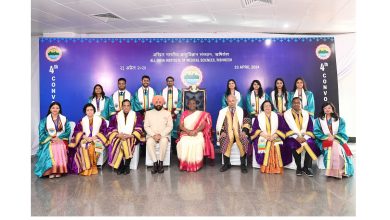
The webinar mainly focussed on the population health and socioeconomic surveillance approaches adopted by G20 countries for tracking COVID-19
ICRIER-KAS recently hosted a webinar on COVID-19 Global Best Practices: Lessons for/From India. Webinar 1 discussed the topic ‘Tracking COVID-19: Public health and socioeconomic surveillance’. The webinar mainly focussed on the population health and socioeconomic surveillance approaches adopted by G20 countries for tracking COVID-19, the kind of results that such approaches have yielded and lessons for as well as from India.
The key speakers at the webinar were Peter Rimmele, Resident Representative to India, Konrad-Adenauer-Stiftung (KAS); Dr Roli Mathur, Scientist ‘F’ and Head, ICMR Bioethics Unit, National Centre for Disease Informatics and Research (NCDIR), Indian Council of Medical Research (ICMR), Ministry of Health and Family Welfare (MoH&FW), Government of India; Dr Shivani Patel, Assistant Professor of Global Health and Epidemiology, Rollins School of Public Health, Emory University, USA; Dr Alicia Mehl, Epidemiologist, Department of Epidemiology and Public Health, Ada Health, Germany; Dr Anand Krishnan, Professor, Centre for Community Medicine, All India Institute of Medical Sciences (AIIMS) New Delhi.
Some of the key takeaways of the webinar are:
The current COVID-19 crisis which is an unprecedented wake-up call that is showing how crucial it is for countries to have right policies and legislations for ensuring pandemic preparedness and prevention. COVID-19 has highlighted the critical pandemic under-preparedness of health systems worldwide. With 33.2 per cent of the world GDP and 14.3 per cent of its population, it is shocking to see Europe and North America account for 61 per cent of COVID-19 deaths.
According to the panelists, it is ironic that the top nine countries with most COVID deaths are G20 members. G20 countries have been disproportionately impacted by COVID-19. Americans account only for 1 in 25 persons on the planet for COVID cases, but one in every five deaths. In the US, the way they identify COVID cases and deaths begins at public and private testing sites/providers. They have to report to local health departments. Local departments report to states health departments, who then report to the CDC at the national level. For much of the pandemic there were problems in the US regarding lack of central leadership and transparency in the data. Therefore, a lot of trust was placed in university, media outlets and other private groups. Effective dissemination to public health authorities as well as the public at large requires timely and usable data and trust in institutions. In the US, race and ethnicity are primary social stratification variables that have been examined to understand health equity and disparity. In Georgia, in 95 per cent of the cases, they were able to collect age and sex data. This shows that it is possible to collect demographic data on cases. However, the data on race has been difficult to collect.
Date for COVID-19 has been difficult due to asymptomatic cases, undertesting, undercounting and, inter alia, the denominator for testing being unclear. There are also lessons to be learnt from rich countries like South Korea, on how to effectively contain spread of the virus without strictly restricting routine life. Countries such as South Korea, Australia and New Zealand have demonstrated how we can learn from past mistakes and deploy effective, long-term solutions to any health crisis that may arise in the future.
ICMR has played a phenomenal role in tackling the pandemic at the national level. It instituted a multi-pronged approach to understanding the disease and tackling it through its work in clinical management, diagnostics, epidemiology, and building task forces, consortiums, collaboration with multiple stakeholders to plan and undertake a whole host of initiatives. ICMR set up national COVID-19 clinical registry to collect high-quality, real-time data on various clinical, epidemiological and outcome aspects of the disease. The Indian government has set up a national institute on One Health in Nagpur for systematic studies on outbreaks as well as biosafety and biosecurity needs. The surveillance capacity, in particular, for COVID-19 needs to be strengthened on a priority basis for robust evidence and evidence-based policymaking. Surveillance involving timely and systematic collection, analysis, dissemination and use of data for suitable public health action is highly critical in such crises.
Greater use of ICT is required to understand and disseminate the data quickly. In disease like COVID-19, the geographical positioning of cases is an important parameter to look at. In the Indian context, the elephant in the room is the data from private sector. More or less, our surveillance systems do not capture what is happening in the private sector. Therefore, there is urgent need to develop mechanisms through which information in private sector is routinely brought in surveillance systems.
Most Indian surveillance systems have numerators without good denominators, and it is not easy to interpret these numerators. Comparison also becomes very difficult – across districts, states as well as countries. If the quality and trustworthiness of data is missing, then the action is not going to be useful either. Channels for communication of data to decision-makers should be ensured in a meaningful way so that evidence-based policymaking can happen. Presently, this is also a big challenge in India. As surveillance is ultimately about action, the capacity to act is very important – the second wave of COVID-19 infections in India has demonstrated that such capacity is missing.




